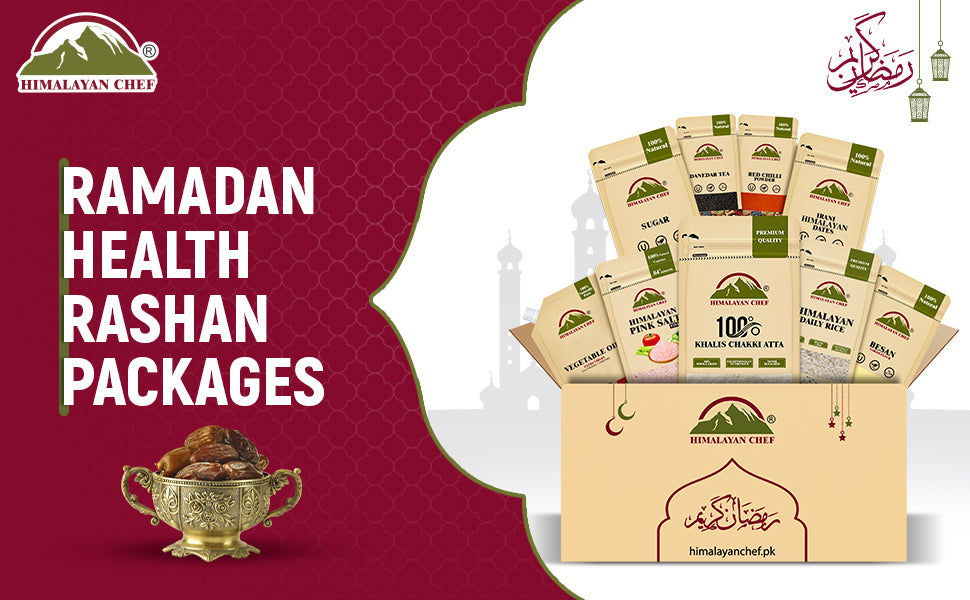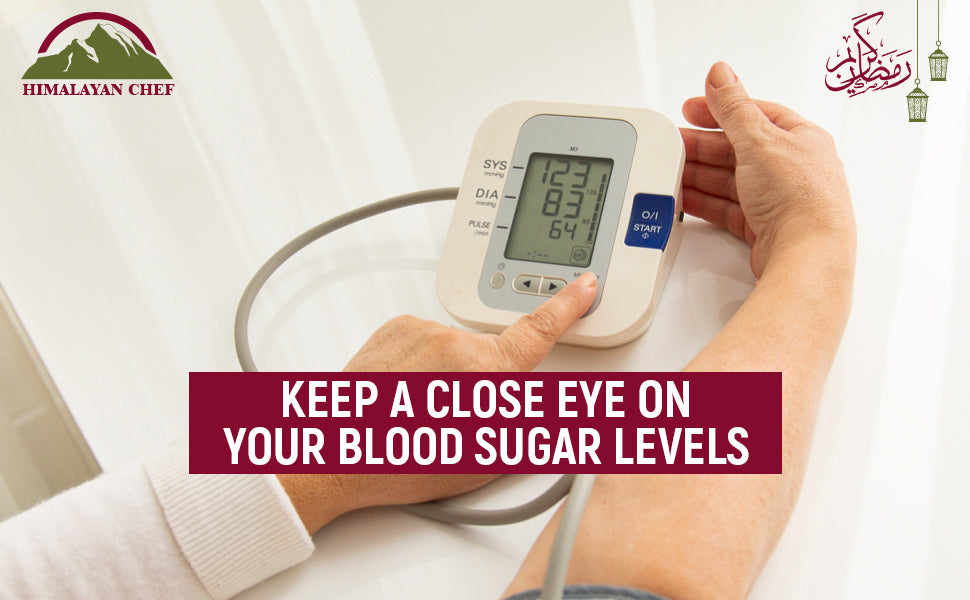Ways to Make this Your Healthiest Ramadan
Posted by HIMALAYAN CHEF

Ramadan is a special time for us, filled with meaning and importance. It's not just about not eating or drinking during the day. Instead, it's a time for people to feel closer to their faith, to think about how they can be better, and to show kindness to others. Ramadan is a time for self-reflection, where people think about their actions and try to become better individuals. It's also a time for unity, as communities come together to support one another. Overall, Ramadan is a special time for Muslims to strengthen their connection with their faith and show kindness to others. However, it's also essential to remember to take care of our health during Ramadan. Eating nutritious foods, drinking plenty of water, and getting enough rest help us have the energy and strength to fully engage in the spiritual activities of Ramadan while keeping our bodies healthy. So, by looking after our health, we can fully embrace the spirit of Ramadan and make the most of this special time.
What Health Challenges People Usually Face During Ramadan?
During Ramadan, some people might forget to take care of themselves properly, which can lead to health problems. This can happen if they don't drink enough water before the fast begins or if they eat too much unhealthy food when they break their fast. Also, not getting enough sleep can make them feel even more tired during the day. Sometimes, people eat too much fried or sugary food during Ramadan, which isn't good for their health. Following are the major health challenges people face during Ramadan.

Dehydration
Fasting can sometimes lead to dehydration, which means not having enough water in your body. When you fast and don't drink water during the day, your body can lose water through sweating and breathing. This can make you feel thirsty and tired. Dehydration can cause problems like headaches, dizziness, and feeling weak.
How to deal with Dehydration during Ramadan?
• Drink plenty of water before starting the fast and after breaking the fast at sunset. Try to drink small sips of water throughout the evening to stay hydrated.
• Avoid drinks that can make dehydration worse, like caffeinated or sugary drinks. Stick to water or natural fruit juices.
• Eat foods with high water content, like fruits and vegetables, during the evening meal (Iftar) to help hydrate your body.

Uncontrollable Sugar Release at Iftar
When people break their fast at Iftar, they might eat foods that are high in sugar, like sweets or sugary drinks. These sugary foods can cause their blood sugar levels to rise quickly and uncontrollably. When blood sugar levels spike like this, it can make them feel very energetic at first, but then they might feel tired or even shaky later on. This happens because their bodies release insulin, a hormone that helps control blood sugar levels, in response to the sudden sugar rush.
How to Maintain Sugar Levels in Ramadan?
• When breaking your fast at Iftar, opt for foods that are lower in sugar and higher in nutrients, like fruits, vegetables, and whole grains. These foods can help stabilize your blood sugar levels and provide lasting energy.
• Take your time to enjoy your meal and avoid overeating sugary foods all at once. Eating slowly and in moderation can prevent sudden spikes in blood sugar.
• Avoid sugary drinks and opt for water or natural fruit juices instead.
• Plan your meals ahead of time and stock up on nutritious foods that control blood sugar levels. This can help you make healthier choices and avoid reaching for sugary snacks when you're hungry.

Weight Management Challenges During Ramadan
After fasting all day, some people feel really hungry when it's time to break their fast at Iftar. They might eat too much food too quickly, which can lead to eating more calories than they need. Some people might choose foods that are high in fat, sugar, or calories, which can contribute to weight gain. Fasting during the day can make some people feel tired or less energetic. They might not be as active as usual, which can lead to burning fewer calories and gaining weight. During Ramadan, people's eating schedules change, with meals often eaten later at night and earlier in the morning. These irregular eating patterns can sometimes disrupt the body's metabolism and lead to weight gain.
How to Manage Your Weight in Ramadan?
• Focus on balanced meals during Iftar and Suhoor. Include a variety of foods from different food groups, such as fruits, vegetables, whole grains, lean proteins, and healthy fats.
• Pay attention to portion sizes, especially when breaking your fast at Iftar. Avoid overeating by starting with smaller portions and listening to your body's hunger cues. Remember that it's okay to Choose nutritious snacks for Suhoor and during non-fasting hours. Opt for fruits, vegetables, nuts, seeds, or yogurt instead of processed or high-calorie snacks.
• Stay active during Ramadan by incorporating light exercise into your daily routine. This could include walking, jogging, yoga, or other forms of physical activity.
• Plan your meals and snacks ahead of time to ensure they're balanced and nutritious. This can help you make healthier choices and avoid last-minute decisions that may not be as healthy.

Digestive Problems
Fasting during the day can sometimes mean not getting enough fiber, which is found in fruits, vegetables, and whole grains. Fiber helps keep the digestive system healthy and prevents constipation, so not getting enough of it can lead to digestive issues.
How to Deal with Digestive Issues in Ramadan?
To prevent constipation and digestive issues during Ramadan, it's important to
• Eat plenty of fruits and vegetables, which are high in fiber and can help keep the digestive system moving.
• Drink plenty of water between Iftar and Suhoor to stay hydrated and prevent dehydration.
• Include whole grains like brown rice, whole wheat bread, and oats in meals, which are also high in fiber.
• Try to eat smaller, more frequent meals during the evening and pre-dawn meals to give the digestive system a break and prevent overeating.
Nutrient Deficiencies
During Ramadan, some people may be at risk of developing nutrient deficiencies due to changes in their eating patterns and habits. Fasting during daylight hours can lead to reduced intake of essential nutrients, particularly if individuals are not consuming a balanced diet during the evening meals Iftar and Suhoor. Common nutrient deficiencies that may occur during Ramadan include:
• Vitamin and Mineral Deficiencies: Fasting may result in decreased intake of vitamins and minerals essential for overall health, such as vitamin D, calcium, iron, and B vitamins. Inadequate consumption of these nutrients can lead to fatigue, weakness, and impaired immune function.
• Protein Deficiency: Fasting may result in insufficient protein intake, especially if individuals are not consuming enough protein-rich foods during Iftar and Suhoor. Protein is essential for muscle repair, immune function, and overall health
• Fiber Deficiency: Reduced intake of fiber-rich foods like fruits, vegetables, and whole grains during Ramadan can lead to constipation and digestive issues.
How Himalayan Chef Grocery Health Packages Tackle Ramadan Health Issues?
Himalayan Chef Grocery Health Packages are designed to help people stay healthy during Ramadan, especially when they face specific health issues. These packages include a variety of foods that are good for you and can help with different health concerns. Whatever health issues someone might face during Ramadan, Himalayan Chef Grocery Health Packages aims to provide nutritious and balanced foods to help them stay healthy and feel their best throughout the month. Following are the grocery health packages offered by Himalayan Chef.
Himalayan Chef Sugar Control Grocery Package
The Himalayan Chef Sugar Control Grocery Package is designed to help you manage your blood sugar levels during Ramadan without sacrificing taste or nutrition. This unique package offers a variety of foods specially selected to support stable blood sugar levels throughout the fasting period. From wholesome grains to lean proteins and fiber-rich snacks, each item is chosen with your health in mind. By adding these foods to your meals and snacks, you can maintain steady energy levels and avoid the highs and lows associated with fluctuating blood sugar.
Himalayan Chef Weight Loss Grocery Package
The Himalayan Chef Weight Loss Grocery Package is tailored to help you achieve your weight loss goals during Ramadan while still enjoying delicious and satisfying meals. This unique package provides a diverse selection of foods carefully selected to support your weight loss journey. From proteins to whole grains, each item is chosen to promote satiety and support healthy metabolism. By adding these foods to your daily meals and snacks, you can create balanced and satisfying dishes that keep you feeling full and energized throughout the fasting period. With the Himalayan Chef Weight Loss Grocery Package, you'll have the tools you need to reach your weight loss goals while nourishing your body with wholesome and nutritious foods.
Himalayan Chef Digestive Health Grocery Package
The Himalayan Chef Digestive Health Grocery Package is designed to support your digestive well-being during Ramadan by providing a variety of foods that promote optimal digestion and gut health. This special package includes a diverse selection of foods chosen for their digestive benefits. These foods help to maintain regularity, support healthy digestion, and keep your gut microbiome in balance. By incorporating these foods into your meals and snacks, you can alleviate digestive discomfort and promote overall digestive health during Ramadan.
Himalayan Chef Energy Booster Grocery Package
The Himalayan Chef Energy Booster Grocery Package is your go-to solution for maintaining vitality and focus during Ramadan. This package is filled with a variety of foods that provide a sustained source of energy, ensuring you stay energized throughout the fasting period. You'll find protein-rich snacks like nuts and seeds, along with wholesome grains in this package that is perfect for keeping hunger at bay and sustaining your energy levels throughout the day. By incorporating these energizing foods into your meals and snacks, you can power through Ramadan with ease and vitality.
Himalayan Chef Gluten-Free Grocery Package
For individuals with celiac disease, Ramadan can pose significant challenges due to limited dietary options and the risk of consuming gluten-containing foods. Traditional Ramadan dishes often include wheat-based ingredients like bread, couscous, and pastries, which can trigger adverse reactions in those with celiac disease. As a result, individuals with this condition may struggle to find suitable food options that meet their dietary needs while observing Ramadan. Himalayan Chef Gluten-Free Grocery Package is specially designed for individuals with celiac disease during Ramadan. This unique package offers a wide range of gluten-free foods that are safe and suitable for those with gluten intolerance or sensitivity. By incorporating these gluten-free options into their meals and snacks, individuals with celiac disease can celebrate Ramadan with peace of mind, knowing that they can enjoy the festivities without sacrificing their health or well-being.
Why Buy Grocery Packages from Himalayan Chef Brand?
Selecting a reputable company that provides high-quality products is important when purchasing a Ramadan Grocery Packages. The first online grocery store in Pakistan, Himalayan Chef, is known for creating delicious, nutritious, and high-quality items that are made entirely of natural ingredients. The company is dedicated to giving people the greatest products at reasonable prices, which makes it an excellent pick for anyone looking to purchase a Ramadan grocery package.
SHARE:


